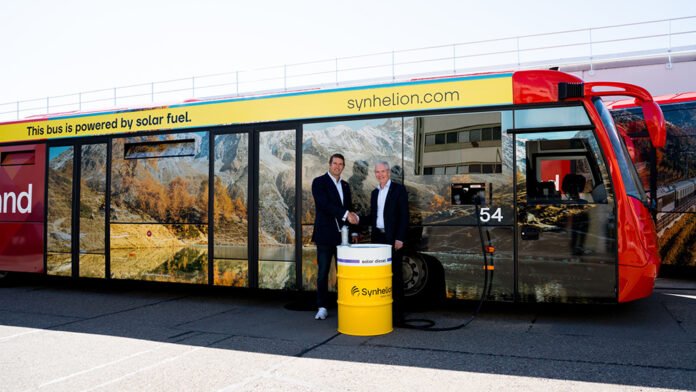Zurich. Synhelion and Zurich Airport have reached another milestone on the road to more sustainable transportation solutions: for the first time, a passenger bus at Zurich Airport has been fueled with solar diesel from Synhelion’s DAWN plant. The fuel is fully compatible with existing engines and infrastructure. Synhelion has thus proven that the technology is ready for deployment and the next phase of scaling.
Just in time for the start of the fall vacation – one of the busiest travel periods at Zurich Airport – the passenger bus powered by solar diesel will be operating in regular service. The bus was fueled with a 190-litre barrel of a solar diesel blend, which is sufficient for around twelve days of operation. This application of solar fuel marks another step toward defossilising the transportation sector and demonstrates that Synhelion’s technology works under real-world conditions. Its compatibility with existing engines makes solar fuel an immediately deployable solution for more sustainable mobility.
First use of solar diesel at Zurich Airport
“The successful operation of a passenger bus with solar diesel shows that our technology is easy to implement seamlessly,” said Philipp Furler, Co-CEO and Co-Founder of Synhelion. “We are proud to have Zurich Airport Ltd. as a long-term partner and customer by our side. Collaborations like this give us momentum for the next steps in scaling up.”
Emanuel Fleuti, Vice President Sustainability at Zurich Airport Ltd., added, “We are delighted to be the first airport in the world to operate a passenger bus powered by solar diesel. Even though it’s just one bus today, this step clearly demonstrates the potential of this technology. In the long term, synthetic diesel will enable us to operate even those vehicles that cannot be electrified in a CO2-neutral manner. Together with Synhelion, we are doing truly pioneering work here for a sustainable future.”
Kerosene, gasoline, and diesel from solar energy
The renewable synthetic fuel comes from Synhelion’s industrial demonstration plant, DAWN, in Jülich, Germany. There, Synhelion uses solar heat to convert biogas, CO2, and water into syngas through a thermochemical process – the basis for the production of renewable liquid fuels. This syngas is then refined into renewable kerosene, diesel, and gasoline. Unlike fossil fuels, Synhelion’s solar fuels are nearly CO₂ neutral: when burned, they release only as much CO₂ as was used in their production. This makes them an immediately usable solution to defossilise transportation – without the need for modifications to existing engines or fuel infrastructure.
Synthetic fuels complement electrification at Zurich Airport
Zurich Airport recognised the potential of solar fuels early on and has been supporting Synhelion in scaling its technology since 2020. In addition to decarbonising buildings and infrastructure, the airport’s net-zero strategy for 2040 focuses primarily on electrifying its vehicle fleet. However, certain special-purpose vehicles, such as those used in winter operations, cannot be electrified due to insufficient battery performance.
Synhelion’s solar fuel is to be utilised for these special vehicles. With the successful first use of solar fuel in a passenger bus, Synhelion and Zurich Airport are jointly proving that using solar fuel is not only possible but also straightforward and scalable.





